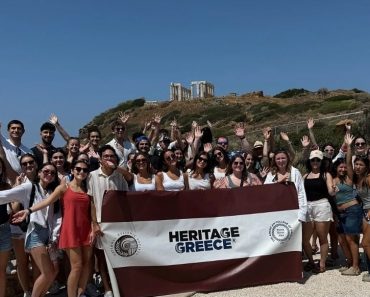
Queens College students, international and national business leaders met at a luncheon in Buccaneer Diner, East Elmhurst.
“I teach a summer course on the Sociology of Food,” said Professor Nicholas Alexiou of the Hellenic American Project, CUNY Queens College, in an invitation. “I will bring some of my students to the Greek diner, the Buccaneer at Astoria Blvd. and 93rd St. We will discuss Queens College, CUNY and community outreach.” As a former undergraduate and graduate alumnus of Queens College, I came to support an international Greek America University sociologist.
On Monday, June 16, 2025, Queens College students, international and national business leaders met at a luncheon in Buccaneer Diner, East Elmhurst, to discuss the sociology of food.
The Queens College students were Fiona Liu, Katherine Parra, and Avi Singh. Prominent persons included: Kostas Skaltsas, Associate MP at the Greek Ministry of Interior-Administrative Reform; Niko Bardis, Treasurer and General Organizer of Pan Gregorian Enterprises, Inc. (PGE), a restaurant/diner cooperative; business leaders Yanni Kamitsis, Kostas Pavlakos, Niko Malonoukos, and Kosta Malonoukos. For more information, contact nicholas.alexiou@qc.cuny.edu.
“I created the only program on the sociology of food for twenty years,” explained Professor Alexiou. “The Mediterranean Diet is a lifestyle: it has to do with how we form a new way of thinking, a new way of expressing. This is opposite the American lifestyle, which for many years was dominated by the fast food mentality of eating fast, efficiently, even while driving. Food died as a theory of understanding ourselves in the world. After WWII, Greek Americans were accepted in the mainstream community. In Manhattan, 500-600 diners out of 800 were owned by Greeks.
Dr. Alexiou authored a book of poetry that immediately sold out. “The President of Queens College wrote the introduction,” he said. “Kostas Skaltsas put my poetry to his music. He is being interviewed in Hollywood for a possible movie.” MP Skaltsas at the Greek Ministry of Interior-Administrative Reform played a recording of his music. We look forward to hearing Prof. Alexiou’s poetry in the soundtrack.
“This course explores the social, cultural, economic, and political dimensions of food production, distribution, consumption, and representation,” Prof. Alexiou explained. “My course explores the Mediterranean lifestyle and diet, emphasizing its cultural, nutritional, and health aspects. Students learn about the history, components, and benefits of the Mediterranean diet of the local Greek region, integrating key lifestyle practices into their daily routines.”
Student Fiona Liu believes, “Food serves as a symbol, structure, and social code. Food practices reveal how meals, cooking methods, and dietary codes function as a system of influential communication. Food operates as a cultural language through which societies express identity, structure social life, and define inclusion and exclusion. The symbolic meanings of food practices reveal the moral and social order of culture. In my household, traditional meals are common, and communal eating is the norm. When friends or guests stay over, they are often surprised that my family consistently eats together. This practice reflects a deeply rooted cultural value around togetherness and reinforces the symbolic role of food in maintaining social cohesion.”
Queens College student Katherine Parra explained, “I took Foundations of Sociological Theory class with Professor Alexiou in Fall 2024. I started that class very nervous due to the context and demands of the course. The course was not anything less than I expected. It was very demanding, tons of readings (some easier than others), challenging testing format, but about halfway through the semester I realized that I wanted to further my studies in the field of sociology. Professor Alexiou inspired me to go from a psychology major and sociology minor to double majoring in psychology and sociology. By the end of the semester, I officially applied to major in sociology and I made sure to let him know I did so because of him.”
Nikos Bardis, Treasurer and Key Organizer of Pan Gregorian Enterprises, said, “We are a restaurant/diner cooperative that is sensitive to the community. Our Greek American restaurant association provides benefits and support to its members, including scholarships and community outreach programs. We try to give money back to the community.”
The PGEI of America Charitable Foundation was established in 1987 as the charitable organization of Pan Gregorian Enterprises, Inc. Businessman Kostas Malonoukos’ son Pavlos, who was my student in a university Modern Greek language class, was a recipient of a Pan Gregorian Enterprise scholarship in 2005. In 2025, Dr. Pavlos Malonoukos is now a successful dentist in Long Island, New York.
Key sociological trends discussed were the changing demographics and cultural dynamics of the Greek American community, which is impacting the diner industry. Food is not just a means of sustenance, but is deeply connected to issues of identity, gender, class, and inequality. The food industry is dominated by a small number of large companies that control the production and distribution of seeds, food, and water, which raises environmental and political concerns.
The Greek American diner industry in New York City is a reflection of the changing demographics and cultural dynamics of the Greek American community, with many traditional diners closing as the community becomes more socioeconomically mobile.
“We see the existence in the appearance of many upscale Greek restaurants, which is another way to realize how New Yorkers now eat,” said Prof. Alexiou.
Professor Nicholas Alexiou, his students, and business leaders of the restaurant/ diner fields provided a dynamic exchange of ideas.
Links: www.hapsoc.org/ – Hellenic American Project www.pgenj.com/ – Pan Gregorian Enterprises, a restaurant/diner cooperative www.youtube.com/watch?v=epON8vKYaZM – Nicholas Bardis interview. www.qgazette.com/articles/tri-state- community-attends-pan-gregorian-dance











